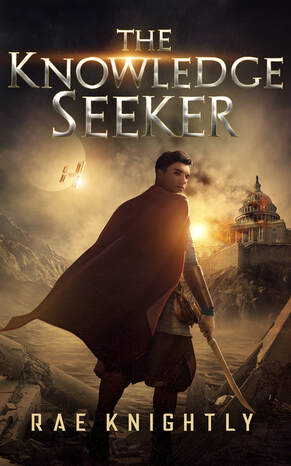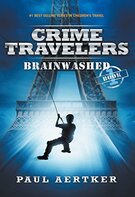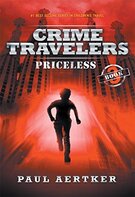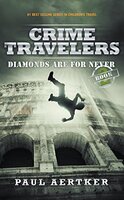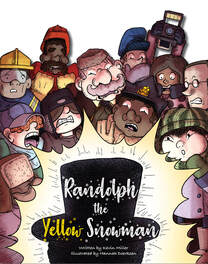|
I'm about 2,000 words into the first draft of Brooms, book 2 in the Uncanny Icons Series. As a result of all the research I've done on witches and curling, this book has taken on a life of its own, making it far different from the story I originally conceived. However, that's always when the magic happens, so I'm happy to be along for the ride. I'm aiming for a spring 2022 release, so let's see how it goes!
0 Comments
Ray Knightly, author of the Alien Skills series, whom I interviewed back in January on this site, has released a new action-packed dystopian adventure novel called The Knowledge Seeker, and it's just in time for Christmas! Here's a brief excerpt: I never asked to be the sole bearer of the entire Knowledge of your civilization. Yet, here I am, barely sixteen-years-old, and it has fallen upon my shoulders to save what remains of humanity from a second Dark Ages. You can find out more about the book on Amazon.
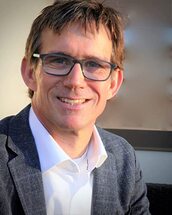 This month I had a chance to connect with Paul Aertker, an award-winning children's book writer, teacher, and frequent speaker at elementary and middle schools. He began his teaching career in West Africa, where he helped establish a village's first public library. As a kid, Paul slept on the streets of London to see Charles and Diana's wedding. He took the CIA exam because he wanted to be a spy for the good guys (and not the "Good Company," an inside joke for the kids who've read Crime Travelers). And now as a traveler, multilingual teacher, and writer, Paul and his wife are on the road again. Crime Travelers is such a brilliant name for a series. Can you tell me what the series is about and how you came up with the idea? Thanks! Crime Travelers is essentially the Bourne Identity adventure series for kids. The books track a group of international orphaned teens who live in hotels, travel the globe, and fight crime worldwide. I am a huge traveler and will hit the road whenever I can, and like many, I am looking for solutions to the world’s problems. When I taught fifth grade, I noticed that many kids had traveled and knew about current world affairs. The students had interesting ideas about solving real-world problems, so I wanted to write a book--as cliché as it sounds--that would inspire other kids to get off the couch, travel, and make the world a better place. So, the series origin came from fifth graders! Who were some of your early inspirations as an author? I like the sardonic and the silly. So Roald Dahl has always appealed to me. The BFG and Matilda especially. If I was feeling philosophical, Frog and Toad always seemed to have the answer. As a kid, I liked grown-up books. My favorite was Catch Me If You Can by Frank Abagnale. I read this book at a very young age, and I loved the travel and the intrigue of Abagnale's crimes, so I've always wanted to bring that intensity to kids' books. How did you get started as an author? Did you start by writing books or something else? I have written as a copywriter for many years, but I started honest book writing on September 12th, 2001, the day after 9/11. I couldn't figure out what we were supposed to do, and I figured that kids would have a better idea of how to change the world than the grown-ups who had gotten us into that mess. You’re also a teacher. How has that informed your writing? Being a teacher and a writer for kids at the same time was a tremendous boon to my books. I’ll give you an example. I used to show up to school about half an hour before class, and I would start reading parts of my books to the kids who’d come early. About halfway through the semester, I had the entire class coming to school early! I got immediate feedback, unfiltered and sometimes harsh, and occasionally great. In addition to teaching, you speak at numerous elementary and middle schools. What tips do you have for other authors who want to do this sort of thing? How do you book gigs? What makes for a good presentation? Two keys to my success. First, establish credibility, meaning no baloney. Kids will smell it the moment you walk into the classroom. Be real. Second, change things up. Once you have done one thing, move on to the next, then the next, and then leave. I like to do three things in this order when I'm speaking to a class. Start with the story. A real story from your life being whoever you are. They want to know you've done some cool things because they want to do cool stuff too. Travel, I think, is always interesting. Tell them something you think is cool or nerdy even. I like superlatives myself. For example, we were on the cusp of the Mariana Trench, 11 kilometers (7 miles) down. The. Deepest. Trench. On. Earth. A fall here would certainly be the end of us all. A little scary and dangerous but keeping it clean. Kids always like being told a story, especially when all they have to do is listen. The rule for speaking to kids is their age times the number of minutes speaking. Fifth graders, in my case, are 11 years old. Therefore, you may not speak, read, or tell a story longer than 11 minutes. Ten minutes to be on the safe side. Game plan: Tell a story for ten minutes-ish, then do a Q&A ten minutes. And then read from your book: ten minutes. So that's thirty minutes in action and maybe fifteen minutes of coming and going, transitioning between different activities, and speaking with the teacher. Leave a copy of your book(s) and then leave. What advice do you have for other authors just starting, particularly those who also want to write for middle-grade readers? Teach, hang out, spend time with your target group. You will be blown away by how smart kids are. What led you to publish independently rather than going the traditional route? Earlier, you asked about being a teacher. I had tried the traditional route for many years: SCBWI (Society for Children's Book Writers and Illustrators) and the like. I got more than 100 rejection letters from editors and agents. In fact, I've been getting rejection letters for so long that I have some snail mail paper copies! When I was reading to the 5th-grade students before school, a mom came up to me and said, “I can't find your books on Amazon or Barnes and Noble. What's going on?” I went home that afternoon, changed my protagonist’s last name to the mom’s last name, and started my own publishing company. What are some of the biggest benefits of being an indie author? One. Getting the book to market in a reasonable amount of time. I was publishing my second book in the Crime Travelers series when I received a rejection letter from an agent I had solicited to publish my first book. Two. If you’re using print on demand (POD) through Amazon's Kindle Direct Publishing and find a mistake, you can correct it within minutes. What are the biggest challenges? It's not easy. You have to quarterback so many parts of the business after you’ve written the novel. One of the most complex parts is switching from being a writer to a business person. You need to know some basics about forming a business, coordinating with beta readers, hiring developmental editors, copy editors, proofing editors, and interior and exterior book designers. And then there's uploading and getting set up on Amazon, which is relatively easy but initially may be intimidating. But it is so worth it! What are your top tips when it comes to marketing your books as an indie author? My favorite tip or my favorite trick for marketing is sending fifth-grade teachers my books for free. I cannot tell you how many emails I have gotten back from teachers who say thank you so much for the books. The kids are fighting over them. Which, of course, translates into sales. There’s no better tool than having your product sitting in front of your customer day after day in the classroom. Have you ever pursued or received offers to go the traditional route? What would it take for you to say yes to such an offer? Great question. This past summer Harcourt in the UK reached out with a letter of interest, and I turned it over to my international rights agent. What would it take for me to say yes? Honestly, I don't think the traditional publishers know how many books I sell and how large the margin is for me as an independent publisher. It would take a lot. What are you working on right now? For Crime Travelers, I am working on a document that my producer is using to pitch in Hollywood. Fingers crossed! My latest book is Posthumous, a middle-grade adventure with mystery, friendship, and heart—like a Da Vinci Code for kids. It’s about a 12-year-old girl who wants to publish her late mother’s children’s stories. (Grown-ups who received rejection letters might notice a familiar sentiment in the book.) You can learn more about Paul and his books by visiting his official website and his Amazon author page. If you're worried about the Christmas gifts you want to order being out of stock, I have you covered. You can order Randolph the Yellow Snowman right now, and I can guarantee delivery for at least two dozen people. Each copy will be signed, sealed, and put into the mailbox by yours truly. You can even dust the cover for my fingerprints to prove it! Alternatively, you can order it on Amazon.com or Amazon.ca. Here's a brief description: "It was a snowman, all right. With a corn-cob pipe, a button nose, and two eyes made out of coal. It had twigs for arms, a stovepipe hat, and a red-and-white scarf wrapped around its neck—or whatever you call the place where the big snowball meets the snowman’s head. Yes, it was a snowman. There was just one problem . . ." |
Kevin MillerBrief thoughts and updates on writing, publishing, and life Archives
June 2024
Categories
All
|
 RSS Feed
RSS Feed

